#(its on both a literal and thematic level its all tied together nicely)
Explore tagged Tumblr posts
Text
the shiori ED in owarimonogatari ge kills me, but theres a very specific part of it that really gets my attention
right before the first verse there's a little flash in this box that shows an object relating to the arc character

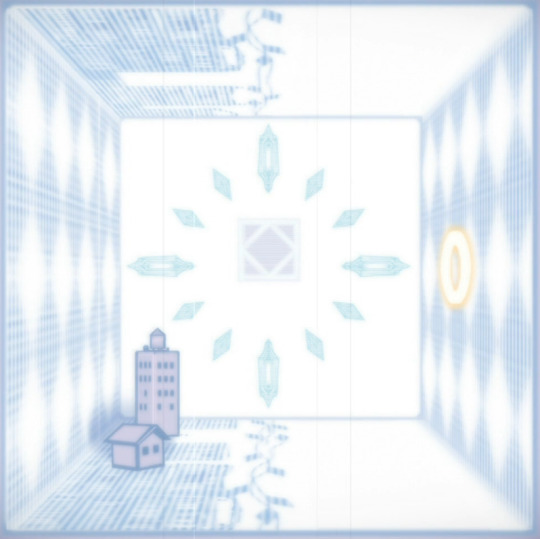
its interesting to see the items for each of them. mayoi's bag is there, and the first thing you notice is that she's not. her bag feels almost synonymous with her, so it almost gives the impression she's left it behind, possibly for a new stage in her life (as it were). hitagi's apartment building is shown, and what i think might be araragi's house next to it. but they're so small that they look like models more than anything, which i feel relates to how these homes are things that are precious to her, they are things she wants to protect. maybe theres something to be said about the home as it relates to family too, and family being very much a big thing to her arc. and maybe theres something to be said about mayoi's thing being "something to protect" too
whats the object in ougi dark, then?
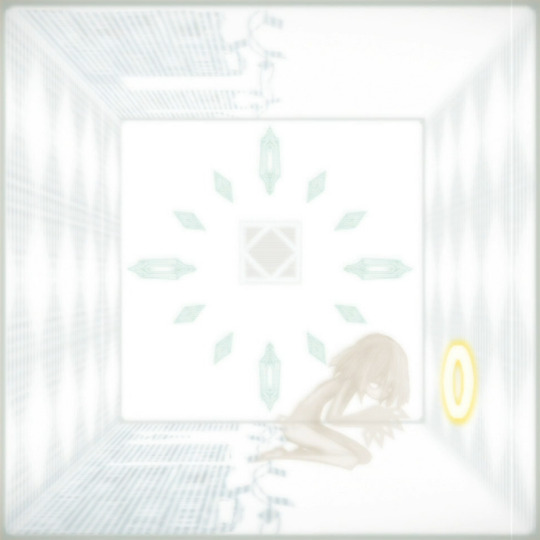
oh. hi ougi
guys im so not normal about this. putting ougi in the same room where the other two had objects that were important/synonymous with them. its because ougi darks ED is for ougi BUT its also for araragi (and shinobu, its about all 3 of them), so its araragis "thing to protect/that is important to/synonymous with him."
but also like. this is also like the only time in the show that we see ougi in any state even approaching nudity, and not just that, ougi is actually naked here (except for the sleeves). and that coupled with the kind of huddled pose really makes this feel like a very vulnerable moment, and a very very significant thing. its saying many things at once. it's saying conception, it's showing you the big bad but not so big and not so bad, its showing you the weakness in a character who has rarely shown anything like vulnerability or weakness, who is still haunting araragi (see the sleeves and the like "gonna get you" hands lol) to the bitter end.
and like if you look closely you can see a little smile which is standard for ougi but like. the hollowed eyes (more ghastly now when theyre white). the inward hunch. the lack of clothes besides the sleeves, that are stylized to look jagged like claws. this is a creature born with a purpose, a creature born to hurt. but this is also obviously a creature who is alone and feeble and Should Be Helped Not Killed for fucks sake lol.
and not just a creature but a person! ougi is armored in layers of separating clothes all the time but this shot is kind of groundbreaking bc it showing that like. she is really just like anyone else. the fronting is very much a front. she, the fake, has Substance. there's a very real person underneath those big sleeves.
and also since the shot is really only for half a second, ougi fades away very quickly. its very much a blink and youll miss it. but that fading away really feels like a flash of vulnerability before she fades away Forever. as in, it's a parallel to her almost final moments. but the fading away in particular feels ghost-ish. not to mention later in the ED shes even wearing like a ghost outfit.
and. god. if that isn't just.
idk. something about. being alive but not really. being a ghost. not long for this world and resigned to it. being so resigned to it you wear it and use that to represent yourself. making it a part of you. and then later being given a life. becoming able to live. idk yk. idk its just , yk its just ,
#and that could go for the others too#mayoi hitagi araragi shinobu#it could be all of them#being resigned to death. being given a life#learning how to live#(and in fact it IS about araragi here.)#(by saving a resigned-to-her-what-she-thinks-of-as-fate hes also saving the part of himself that believes he must die)#(its on both a literal and thematic level its all tied together nicely)#monogatari#oshino ougi#senjougahara hitagi#hachikuji mayoi#ougiposting#owarimonogatari ge#ill talk more about this ed later but this part is so stand out to me#like i understand intellectually but i dont understand the feeling of being extremely cautious/terrified of ougi as a viewer#ougi is posed as “the main villain” but is Not Actually So#thats a framing from gaen to make araragi more likely to kill her#“the enemy” she says#ougi is just ougi#a naked ghost hunched into themself. a vulnerable creature. a person#like idk how you could listen to dark cherry mystery and think ougi should have died in ougi dark (REAL THING PEOPLE THINK)#like: “i'll pick up the possible futures we could have had and chase after you!”?#thats not the words of a black and white villain#ougi is trying so so so hard and desperately wanting to do something meaningful with araragi and more people should recognize it#and really theyre so consistently thoughtful and philosophical like. the impression you get is not that theyre always trying to hurt ppl#the impression is that theyre trying to . Think. to develop ideas and reach the right conclusion
11 notes
·
View notes
Note
Eri and Shigaraki are obviously supposed to parallel one another, but in the sense of "showing what might have been both ways" not in "Eri was saved, so Shigaraki will be too", I think.I can't say anything for certain, obviously, but I feel like everything we've found out makes any salvation for him less likely, not more. I would like for the series to directly address that the two characters have important similarities, though. like enji and bakugou 1/3
I think the parallels between eri and tenko of them exist primarily to demonstrate how much of a difference it can make depending on how people are treated and, on a slightly darker level how the people that heroes protect can potentially become the villains that heroes were protecting them from in the first place. Shiggy is one of those tragic cases where you can totally see that he could have been redeemed if he had been helped sooner, but it’s nearly impossible to imagine a scenario 2/3
where his current self could be redeemed. Shiggy could of possibly been redeemed when he was a child, if someone more morally sound got to him before All for One did. Sure, he would of likely been a traumatized and guilty wreck once he realized exactly what he did but atleast he would of had a chance. In the present he’s not so much someone to be redeemed as he is a serious threat to public safety that needs to be contained. 3/3
Thanks for the ask, anon! You’re free to disagree with me all you like, I hope you don’t mind if I continue the discussion. I consider this blog to be all about discussion so nobody is truly wrong, all I can do is restate my point of view and hope it’s understandable.

Shigaraki’s Character Development and Why it Shows There’s Still a Chance for Him
Shigaraki is an ugly, messy, bad person one who is hard to sympathize with. The entire point of his conflcit is that it’s difficult to imagine him being saved, but the story goes out of its way to show that he is at the same time, a person capable of changing for the better. If he were a lost cause, he would only experience negative development not the positive development he’s been shown. The plot is heading towards Shigaraki being saved not because people should have to sympathize with him, but because Shigaraki has a character arc. He’s not spiraling out of control, he’s growing into becoming his own person outside of the threat to society All for One intended him to be.
I never once said in my post that Shigaraki deserves redemption, or is going to be redeemed in a straightforward manner. My post is entirely about how moralizing the way one victim of abuse acts, in comparison to the way another victim of abuse acts and deciding which one of them should be saved based on that black and white judgement is wrong. At that point the complexity from both characters is erased to rule that Eri is the “good victim” and Shigaraki is the “bad victim.”
Saying that only Eri deserves comfort or solace from what has been done to her is the same as saying that victims only deserve to be helped if they are acting a certa “acceptable” way. It was also about the complexities of empathizing with someone. Not every case of empathy is going to be beautiful, not every person you’re asked to sympathize with is going to be as straightforward as feeling bad for a crying little girl. Sometimes people don’t cry, sometimes people resist you every step of the way, sometimes people are ugly and hard to confront but that does not make them any less deserving of empathy.
Shigaraki does not stop being a human at any point. His victim status does not get negated by the fact that he has grown up. Especially since, Shigaraki is still very much underneath All for One’s thumbs and in the middle of his machination. In fact because Shigaraki is still a human who is effected by the environment around him he has been shown
#1 - Shigaraki has a character arc, and is directly tied to the themes of the story
Most importantly, Shigaraki is a character with an arc. The reason I say he is going to be saved isn’t because I like redemption arcs, or I think every villain needs to be redeemed. In fact I hate the term “redemption arc” because it’s dumb, literally what makes a redemption arc good is the same thing that makes any other character arc good, a character facing consequences for their actions and being forced to change. A character getting their teeth repeatedly kicked in until they learn better.
You have to think of this story in terms of themes, and characters. Shigaraki is the second most important character thematically after the Deku, so he’s not just a tragic case that can disappear after one arc. What exactly would the story be saying if a kid who has basically been abused all of his life and raised as a child soldier gets “put down” before any single person sympathized with him or even gave him a chance? That you only get saved if you’re lucky enough to be saved? That’s super optimistic there.

Thematically the main conflict of the story is that in a society made up of heroes, there are people who do not get saved. This is how the story starts “In this world people are not created equal”, this is what Shigaraki thinks when he is alone in a crowd of people desperately begging for people to help him, only for people to ignore him, because he looked too ugly, or too dangerous to get involved in.
I’m not saying Shigaraki deserves to be saved because it’s nice, or because I want him to, by “deserves” I mean this is an idea the story is building up and should be paid off. The theme is a question and the events that happen in story is an answer.
What exactly do we learn if Shigaraki is just “put down by the plot?”
That some people don’t get saved? But we already knew that at the start of the story. It is the literal first line in the story. By that logic Deku should never have gotten All Might’s Quirk, because he was unlucky enough to be born without it. The point of stories is that they challenge the status quo, change it, and then resolve it. My Hero Academia is not a cynical story, it’s about using effort to change and overcome the things that are unfair about the world rather than just succumbing to the world’s flaws around you. It’s a story where the system can be overcome, where the heroes are expected to be heroes and do better to make up for the failures of the previous generation.
At the start of the story Shigaraki was just another villain to take down, if that’s his final fate at the end of the story then there was no point in following him for hundreds of chapters. He could have just been a villain that disappeared after the first arc, and then got replaced by Stain, and then got replaced by Chisaki, and then by Re-Destro.
The point is the story is choosing to focus on Shigaraki’s growth and development because the author plans to go somewhere with it. Since My Hero Academia is thematically about saving people, and Shigaraki is the most difficult character too save, but also emblamatic of the victims that society creates it makes thematic sense to save him. Your argument that Shigaraki only serves as a bad example of what could have happened to Eri had she not been saved does not work, because Eri is not an important character. She’s introduced in chapter 129, as opposed to Shigaraki who makes an appearance in chapter 13.
As someone who loves the Overhaul arc, and who adores Eri, at this point Eri is not that much of her own character. She basically exists for two reasons, the relationship she has with three important characters (Eraserhead, Mirio, Deku) and also the plot point that her quirk is a weird macguffin that needs to be studied. Despite being in a highly volatile and violent environment as a child, Eri shows almost no negative signs of her abuse at all (that is getting violent herself, acting out, lashing out) and is basically gets over most of it writing wise by having a fun day at a concert. Once again, I don’t think this is bad, it’s just that Eri isn’t as important to the plot so she’s written the best she can with the limited amount of focus she’s given.
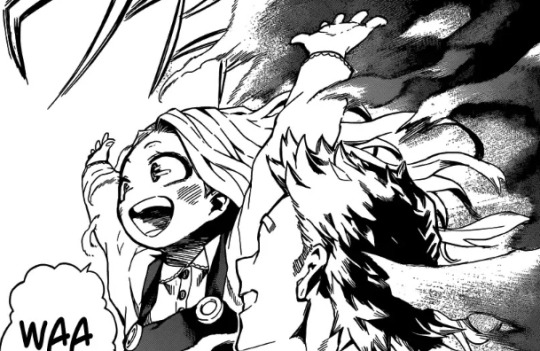
Eri is entirely there for her relationships to other characters. Therefore, it makes far more sense that Eri is there to serve Shigaraki’s storyline, not the other way around.
See let’s use star wars. Darth Vader is there to be a negative foil to Luke, to show a jedi who fell to the dark side as Luke’s literal father. The possibility that Luke can fall to the dark side is present in his connection to Darth Vader. However, the reason Darth Vader does not get a full redemption arc in the original trilogy is that Luke is far more important a character being the main character.
As opposed to Eri who is just a side character, compared to the literal second most plot important character. Shigaraki is connected to the conflict with All for One which is the central conflict of the story, and he was born into it rather than Deku who inherited it from All Might. Shigaraki is connected to the idea that some people are not saved by Hero Society, and are victims who fall through the cracks and then grow up to be villains. Shigaraki is connected to the idea that some people’s quirks are not really able to fit into society if they are actively destructive and dangerous, that some people have more villainous quirks and are therefore stigmatized and not help. Shigaraki is connected to the conflict with Endeavor because Dabi is his right hand man. He was connected to the Stain conflict due to AFO pulling them together.
Finally, yes there are villains who like Shigaraki could have been saved but are defeated instead and their backstory only exists to make them a tragic character. Chisaki is the biggest example that I can think of, because he’s a heavy character foil to Shigaraki, they were both abandoned as children and picked up by father figures in crimminal syndicates who ultimately saw them as tools.
However, the difference between Chisaki and Shigaraki lies in the writing. Shigaraki has a character arc, and Chisaki does not. Shigaraki exists in several arcs and persists in the story, and Chisaki disappears after one arc. Which is the point, that what we’ve been shown makes the prospect of Shigaraki’s salvation more likely, because we’ve been shown he’s capable of growing and changing. Shigaraki, just like any character in the plot screws up and then when his screw ups explode in his face he learns and gets better.
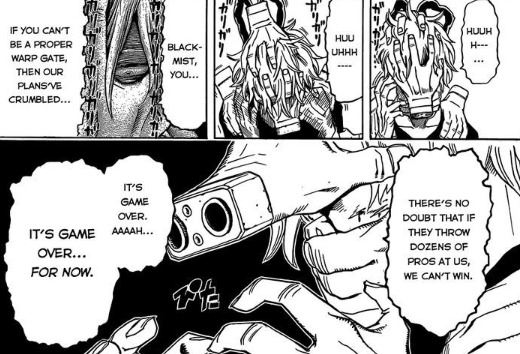
Shigaraki is introduced as a character who cares nothing at all about his allies, is fickle, gives up easily. He is almost exactly what All for One raised him to be, a symbol of fear, who kills for no reason, and seems to only exist to destroy and hurt others.
All for One’s intentions were to make Shigaraki someone with no positive emotions, someone with no positive qualities, no positive relationships. Someone who is only capable of hating, only lashing out in anger. Hanging onto those negative emotions completely stunted his growth and made him incapable of developing as a person.

When he is first introduced, Shigaraki is not his own person but acting exactly as All for One wants him to be. However, the point of Shigaraki’s failure in not only this arc but the next arc is that Shigaraki is told again and again that his methods do not work. None of his allies want to work with him, he cannot make his plans work because he’s just attacking for the sake of attacking without an objective. He’s also entirely dependent on what All for One gives him, and can’t really accomplish anything on his own, and has to use the fallen king of evil’s vast amount of resources.
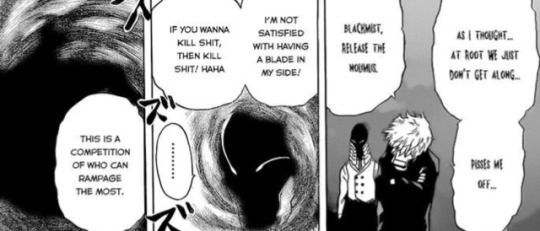
He throws tantrums, he loses out on potential allies, he squanders resources on his petty little emotions. The point is not only does Shigaraki fail again and again, but it’s also something he’s consitently called out on. When he fails, he does not get the results he desires, and nobody coddles him for it.
Shigaraki is told that if he wastes his allies then he’ll be a failure by Kurogiri.
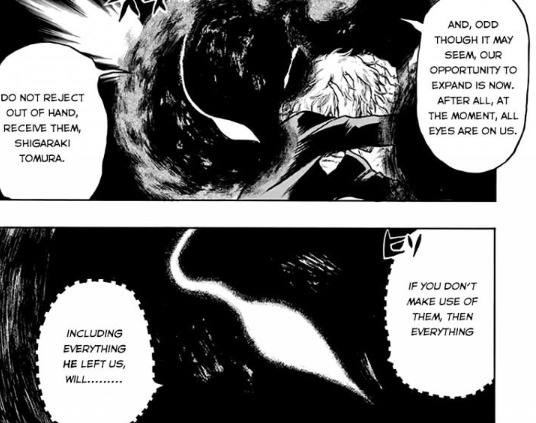
Deku tells Shigaraki to his face that Stain is a better viallin then him, and more people believe in Stain, because he doesn’t give up that quickly, because he gives them something to believe in and a reason to fight.
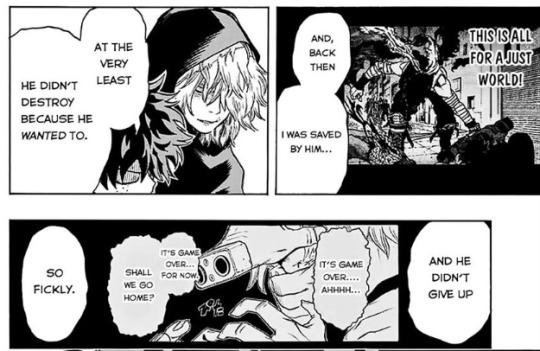
Shigaraki’s plan to kidnap Bakugo to find sympathizers completely blows up in his face (quite literally as well), and not only does Bakugo lecture him yet again, but he loses the one support system he had in All for One as a result of his failure.
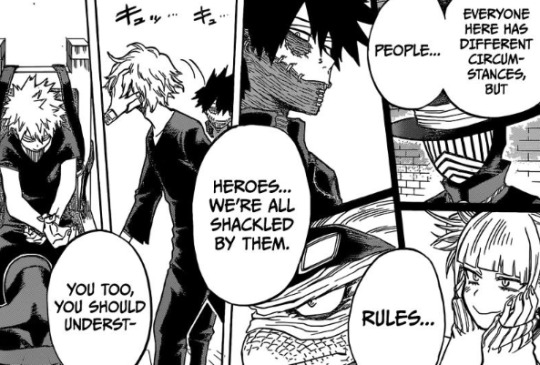
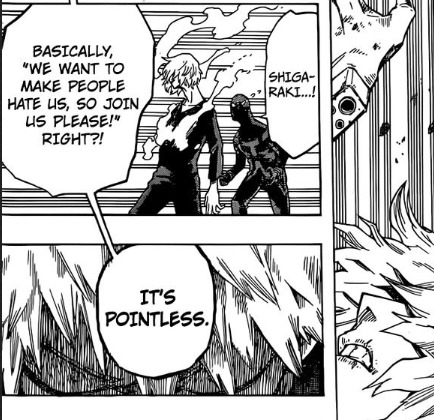
Not only does Shigaraki lose the security and infinite amount of redos that he had, he also feels the consequences to his actions for the first time.
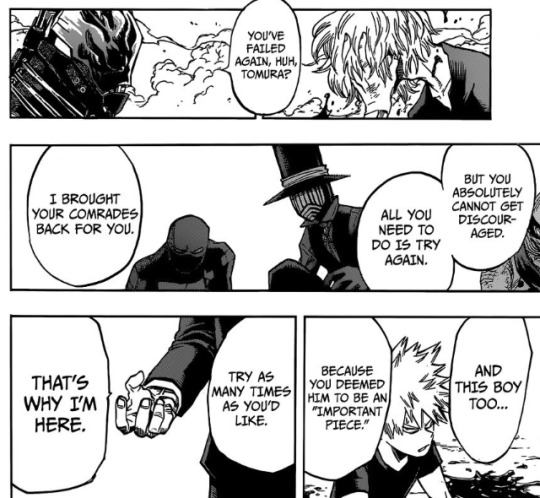
An intentional move on All for One’s part to make Shigaraki realize he is responsible for his own actions now, and cannot be like a child having their parental figure clean up all of their messes for them. A move that forces Shigaraki to grow up on his own.


It’s also no surprise that by the time that by the next time we cut to Shigaraki, he’s learned to value people more. After all, he’s now lost the one person he did have an attachment to in his life and he knows what that pain feels like. Not only does Shigaraki in the Chisaki arc get lectured and have his past failures held against him yet again as a person.
Shigaraki’s lack of a plan, and how much he let allies slip out of his hands in the past are both things that he is criticized for, and also something he faces a direct consequence for. Due to the fact that he was not enough on his own to bring Chisaki into line, in the resulting Melee in the league vs the Yakuza magne dies, and not only that Shigaraki also has to bow his head down to Chisaki and agree to work under him in order to get what he wants this arc.

It’s at this point we see Shigaraki’s growth as a leader. He’s no longer someone who does not care about his allies, because he speaks to them on a personal level, and also takes responsibility for his failings and mistake. He’s learned the value of his allies, and how to speak with them. This is a complete 180 from the person who tried to kill Toga when she first met him because he annoyed her.
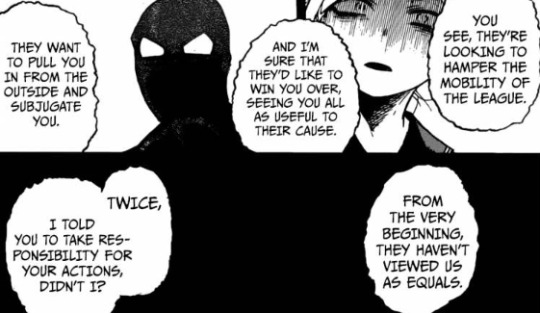
However, his victory against the Yakuza and choosing to pursue personal vengeance over joining hands with the Yakuza is also something that has consequences for Shigaraki.
They are out of money, directionless, and his own allies are questioning him because he doesn’t make it clear what he wants to do for them, or what his goals are. Even though the League of Villains is close, they’re not sycophants like Kurogiri, so they don’t just unquestioningly do whatever he says or put up with him. They actively call him out.
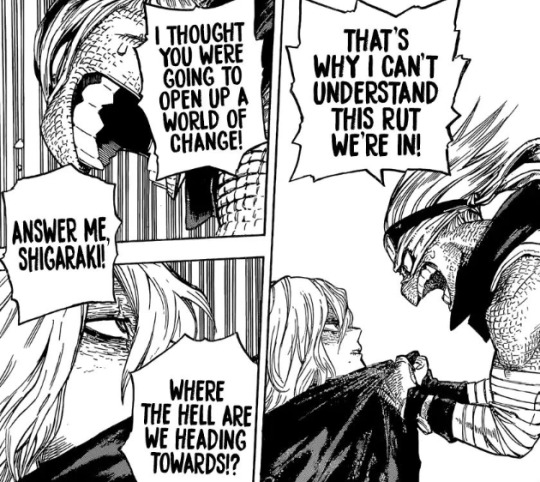
Not only that, but Shigaraki is called to prove himself yet again. He’s called out for accomplishing nothing, despite starting out with the vast amount of resources that All for One gave him. The league of Villains has notoriety and not much else, because at the moment it consists of a core group of homeless twenty year olds strapped for crash and stayin in a dump.
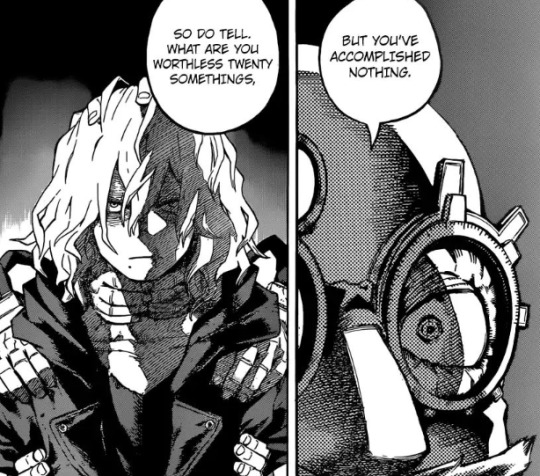
However, Shigaraki’s character arc is not an arc that just develops him as a villain. He also develops as a person as well. Shigaraki himself is aware of the fact that even if he were to become the perfect king of the villains and All for One’s successor that’s not something that would satisfy him.
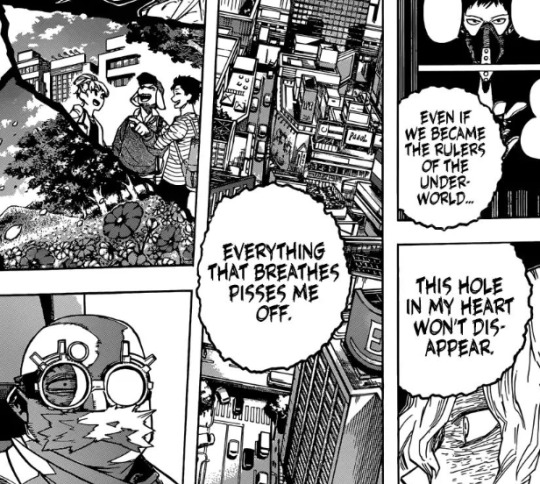
Yes, characters are defined by their choices. Shigaraki can make choices now and those choices have meaning. But it’s also important to remember that there’s no such thing as a person with 100% free choices to define who they are. There are choices you get, and things that are chosen for you, and a lot of times especially in stories characters are defined by what they choose when given the choice.
Shigaraki has consistently chosen to value his allies, ask people to believe in him, connect on an emotional level, and even to try to save the people who are on his side when they are lost. These are not things All for One would choose, because All for One raised sycophants and disposable pawns. We see when Shigaraki is given the choice, he chooses to grow on his own to be a better person, despite being met with constant failure. At no point does he give up, or give in.
By being what All for One wants him to be, Shigaraki completely fails as a person. He only starts to grow and change for real when allowed to be his own person. When he grows independently from All for One, he shows positive character growth that a person who is supposedly past the point of no return should be incapable of.
Shigaraki at the start of the manga was an insane misanthrope with no social skills at all, who was fickle, gave up, barely tried, and just wanted to lash out.
Shigaraki now is a person who values his allies, is capable of planning for things in advance, has the determination to fight an impossible battle against an entire city for the sake of one ally, and was clever enough to actually win that fight. If Shigaraki cannot be saved, then why have we already seen him heal to this point? Why are we shown he is capable of change and improving as a person?
Shigaraki is constantly told how terrible he is and is forced to grow. The most Deku does is occasionally break his bones.
#2 Bakugo and Enji
Saying that Bakugo and Enji are characters more redeemable then Shigaraki is a pointless statement to me, because Enji and Bakugo are already tied thematically to Shigaraki’s plotline. You cannot have one without the other. You see, because Bakugo and Enji are both explorations of the idea that there’s more to being a hero than just punching villains.

This is the ideal end point of Deku and Bakugo’s rivalry. That both of their ways of idealizing heroes are misguided, because Deku always hurts himself too much because he prioritizes saving others over his own safety, and Bakugo cannot save others because he is a hero mainly to be the strongest, and to defeat villains.
Which is one of the critiques of hero society that the story has offered, that there are heroes who are in it not to save other people, but to be the strongest. Which is an unhealthy attitude, because it leads to Bakugo bullying Deku for years over his fear that Deku was looking down on him, and Enji taking out his feelings of failure on his own family.

Bakugo and Enji are not good heroes, specifically because they would never save someone like Shigaraki. Their priorities are not in helping victims to begin with, just beating up villains because they want to feel strong. If the story is thematically about saving others, it makes sense then that these two characters would be challenged to, yanno, save people.
If the Ultimate Ideal end of Bakugo and Deku’s relationship is someone who will always win, and save others, then it makes sense for Deku to grow into someone who would not lose to Shigaraki, but also someone who would refuse to see Shigaraki as a victim and be capable fo saving him.
Also, there’s almost a world of difference in the motivations between Bakugo + Enji and Shigaraki. Bakugo’s backstory is that everybody told him how special he was and he put too high expectations on himself. Now, that was mainly an oversimplication (I have done an entire post on how Bakugo pressuring himself is relatable and also his behavior is a failure on the part of the adults around him to reason with him and discipline him because he’s still a child, just check my mha meta tag)
The things which shaped Shigaraki into the person he became he had almost no control over. What happened to his family was a freak accident, All for One finding him was due to who his grandmother happened to be no fault on his part. He was basically raised in a basement and his only exposure to the outside world was when All for One sent him out to kill people.
Yet, despite being not responsible for a lot of things that turned him the way he was, Shigaraki takes a lot of personal responsibility for his growth. It is on Shigaraki to learn from his mistakes and right those things. When he fails, Shigaraki takes the brunt of the failure.
Yet, we have people like Enji who for the most part just blames the circumstances around him and does not change. The reason people want Shigaraki to get exploration as a character is because he does change, and he takes personal repsonsibility to improve himself and faces consequences for his action. Enji faces no consequences for his actions beyond the people he abused not liking him, and he still stays the same person. He still only values individual strength, he still fights by using flashy moves to defeat villains while critically endangering civillains.

Bakugo is a kid, and he’s also learning to build bridges with Deku instead of repeating his behavior in the past, so he’s capable of change and resolving the conflict of his character that he can be a strong person good at defeating villains but that does not necessarily make him into a good hero.
Shigaraki has also demonstrated that he is a person capable of taking responsbility for his mistakes, and changing to be better. The reason he’s being explored as a character is because he can change.
Endeavor in his refusal to change far more fits the bill as a tragic example that you were trying to talk about in your response, because that’s how stories are written. Stories are all about development, and change.
179 notes
·
View notes
Text
fine line analyses
these are thoughts; my thoughts. if you don’t agree please be reasonable and just ignore.
tumblr fucking ate this post so here i am. rewriting it all.
tw: i talk about alcohol, drugs, grief, and death
the album in general uses the extended metaphor of yellow. the colour is mentioned in nearly every song and i’ll explain why or why not later. the yellow is hope, happiness, and all things nice but as all archetypes it has a ‘dark’ side; it means cowardice and/or deceit. it also seems to follow the hero’s journey which is interesting.
side a: love/light vs dark. exposition.
golden begins the album already in sunshine; in happily vibes imo. gold is the ultimate illuminated colour, so to use it is... the next level, especially as the album opener. “take me back to the light / i knew you were way too bright for me” are ideas that come back in lights up. i love the juxtaposition in this song: “hold [the golden (light)], focus, hoping,” and then a couple lines later, “i’m hopeless, broken”; showing that at the same time, he’s hopeful and hopeless. i love that he alludes, in the entire song, that his person is the sun but he never says it outright: “you wait for me in the sky / [your light] browns my skin just right / you’re so golden,” which come back in sunflower. “i know that you’re scared / because hearts get broken / because i’m so open” immediately made me thing of strong. both he and his lover overwhelm each other at times: “you were way too bright for me,” “you’re scared / because i’m so open”; but ultimately this is a song about devotion: “i don’t wanna be alone / loving you’s the antidote.”
watermelon sugar doesn’t have anything outright yellow; however, the entire lyrics are rooted in imagery surrounding summer which inherently involves a sunny, especially when he calls out that it’s “warm,” that there are “berries,” that it’s “the end of June,” so my point stands. this song has already been analysed, i think, so i’m not gonna go too into it; in a nutshell, it’s the sweetest of loves. “tastes like strawberries on a summer evening” calls to we made it’s “remember how it tasted / looking into your eyes,” and the absolutely feral warm image of tasting moments makes me crazy...the tenderness..oh god.. “it sounds just like a song” comes back in many other tracks; in sunflower, “plant new seeds in the melody” -- try to find new beginnings in the music -- and also “want you more than a melody.” harry says this one was “the hardest one to finish” which could suggest ongoing events.
adore you has yellow in “honey” and “lemon” and hidden in “summer skies” and “brown skin.” thematically, this song is the same as watermelon sugar; devotion. “walk in your rainbow paradise” -- a rainbow is renewal, promise; a gateway, the calm after the storm. to be with his lover is to walk in paradise, away from all evil. though their lack of communication plagues them, it can sometimes be how they find their peace: “you don’t have to say you love me / nothing / [that] you’re mine.” “i’d walk through fire for you” reminded me of happily and through the dark.
lights up, too, has already been discussed at length; “what do you mean? / i’m sorry by the way / i’m never coming back down / can’t you see / i could but it wouldn't stay?” will speak volumes to anyone who’s been closeted, even if nothing extreme. “i’m never coming around / it’d be so sweet / if things just stayed the same” would be the melancholy and fear of watching those you love slip away because of something you can’t change; and, even if it doesn’t, there will always be the little things that change, like how you’re perceived. “all the lights couldn’t put out the dark / running through my heart” is one of my favourite lines; it speaks of the things within himself he’d rather hide, and yet, all the pride he’s told to have does nothing to erase his bitterness towards the feeling -- internalised homophobia/transphobia. however -- “step into the light / so bright sometimes / i’m not ever coming back” -- as overwhelming, as scary, as engulfing as it all may be... it’s much better to be in the light than in the dark; back to golden. the yellow in this song is in the ‘light.’
side b: complete abstinence of yellow. abyss.
cherry presents vibrant red rather than yellow, perhaps to illustrate the glossy jealousy he expresses in this song, and possibly to say he is angry despite sounding defeated. thematically similar to woman. i don’t think this song is dismissible because its aspects all come back: “gallery” is again in sunflower; “don’t call me baby” returns in to be so lonely. “there’s a piece of you in how i dress” reminded me of “painted nails make harry beautiful” :’) also, “your accent” is pretty loud. if anything is to be said about the ending, is that it’s in the “language of love.”
falling is very clearly the death in the hero’s journey; the lowest point from which he could only rebirth. again there are communication issues: “forget what i said / it’s not what i meant”; “we’ve run out of things we can say.” and then there’s rediscovery: “what am i now?” he asks, after having asked the listeners if they know who they are; and his despair seems tied to insecurities -- “what if i’m someone i don’t want around? / what if i’m someone you won’t talk about? / what if you’re someone i just want around?” (notice the flip of pronouns in the last two; switching the blame. harry and louis seem to do that a lot; the blame is passed from one to another in songs. he blames himself in this one, though: “there’s no one to blame but the drink and my wandering hands.”) the biggest insecurity lies in the line: “i get the feeling that you’ll never need me again,” in which harry just wants.. to be needed; to be loved and to be in love. overall he’s asking for redemption, whatever of.
to be so lonely is still sad, but obviously a rise; a rebirth. “don’t blame me for falling / i was just a little boy / don’t blame the drunk caller / i wasn’t ready for it all / you can’t blame me, darling / not even a little bit / i was away / and i’m just an arrogant son of a bitch who can’t admit when he’s sorry” -- the opening verse is just all excuses, all flimsy at best; pushing the blame around. “i was just a little boy” had me screaming; “don’t blame the drunk caller” is distancing himself as far away as possible even though....that’s him, drunk-calling; he said so in falling: “there’s no one to blame but the drink and my wandering hands.” the last one is not even trying; he just straight up says he’s arrogant.. lol. again he’s rooting onto insecurites: “i just hope you see me / in a little better light” asks his lover not to only see him as the stupid little boy who became a needy and arrogant drunk caller; and again he pleads for mercy with rather nonsensical logic: “do you think it’s easy? / being of the jealous kind?” overall, these three songs together could be interpreted as a breakup, though the romantic songs in the album would support better that there have been really rough patches in their relationship; specifically times in which they were caught in untimely scheduling inconveniences amid fights. but see it how you will.
she is a projection. harry tries out the ‘normal guy’ archetype, giving his character a nine-to-five office job and the predictable (supposedly married) life with kids; he likely did this to try out a different perspective of his feelings and/or to appeal to his audience, who is mostly not made up of millionaires. right away, he’s pretending, with the most basic of things: “[he] sends his assistant for coffee in the afternoon / around 13:32 / like he knows what to do.” as for the whole chorus and “a woman who’s just in his head / and she sleeps in his bed / while he plays pretend” is, to me, the woman inside him who aches to be seen; she represent his struggles with binary genders, both of which are oppressing. “he takes a boat out / imagines just sailing away / and not telling his mates / he wouldn't know what to say” is literally eroda?? and shows communication issues. again.
side c: ascending
sunflower makes the yellow comeback.. loud and in your face. the sunflower is commonly associated with the sun tarot card, which often depicts them with children, who are mentioned... the card stands for clarity and success. this song is thematically like watermelon sugar and adore you, but it just has that stoner vibe you know ? “kids in the kitchen listen to dancehall” triggered “even as young as you are.” again, there are communication issues; “i’ve been trying hard not to talk to you” “let me inside, i wanna get to know you / wish i could get to know you” “i was just tongue-tied / i’m still tongue-tied.” “i’ve got your face / hung up high in the gallery” again shows adoration; with cherry’s “does he take you walking through his parents’ gallery?” it could be interpreted as, are his parents showing you off like i do? a big note about it: “hung up high in the gallery / out of this shade” in the light! this is major.
canyon moon shows yellow in “the world’s happy waiting / doors yellow, broken, blue” -- happy, first of all. the doors are portals that they’ve taken, will take, or could take; some are happy, some deceitful, some sad. i find it very interesting that in she “the man drops his kid off at school” and in this one jenny tells her husband to “go get the kids from school.” “two weeks and i’ll be home” loud loud loud. paris and rome are both romantic cities. “[she -- jenny?] pretends not to know the words” again shows some pretending, perhaps to show that we all pretend about things in life, even mundane activites... just a fun song about being away and missing each other like right now.
treat people with kindness is the only song outside of side b that does not have yellow. i think that is because, though this is a happy song, it’s jus a cover up -- he’s burying his grief in the music and drugs/drinks. “and it’s just another day / and if our friends all pass away / it’s okay.” “feeling good in my skin / i just keep on dancing” shows the other effect of numbing all the insecurities and fears he normally carries.
side d: settling. the first sign fine line is a track to be paid attention to is that it’s the titular the track. the second push is giving it its own side on the record.
fine line is another side of she, for which i liked this eloquent explanation. it’s a drastic shift in mood from tpwk to fine line; harry truly shows how vulnerable he is. he’s divided -- “you sunshine, you temptress”; god, when i read/heard that i cried. so beautiful, so appeasing, but it looks like such a distant dream. unachievable. furthermore i think making this song about a relationship, or anyone other than harry and harry’s inner demons is belittling it; belittling his internal struggles to reach the so desired fine line...
11 notes
·
View notes